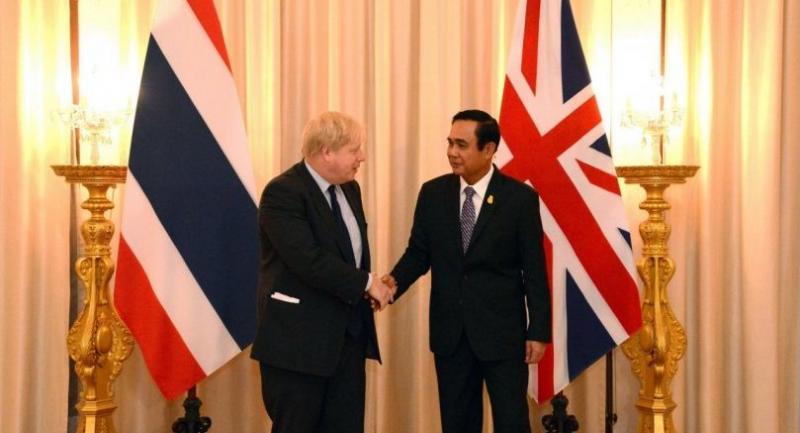Johnson focuses on repatriation of Rohingya, goes soft on democratisation

BRITISH FOREIGN Secretary Boris Johnson yesterday discussed with his Thai counterparts and the head of an advisory board on the Rohingya crisis the important conditions for the repatriation of hundreds of thousands of refugees to Myanmar’s strife-torn Rakhine state, but did not ask for Thailand’s help on the matter.
Johnson met with Thai Foreign Minister Don Pramudwinai and later called on Prime Minister Prayut Chan-o-cha during his official visit to Thailand, the last leg of his Asian tour, which also took him to Bangladesh and Myanmar.
The Rohingya crisis erupted in August last year after a militant group launched attacks against security outposts in Rakhine, prompting a tough reaction from Myanmar authorities, who killed hundreds and displaced nearly 700,000 people to Bangladesh.

Nay Pyi Taw and Dhaka have reached a deal to repatriate the refugees within two years but the process was delayed last month due to the lack of preparation. Ministers from the two countries will meet later this week to push forward the planned Rohingya return.
Don said after meeting with Johnson that his British counterpart prioritised the Rohinyga crisis but did not specifically ask for help from Thailand on the issue.
“We shared the same concerns over the atrocities in Rakhine state and determined it was necessary to find proper solutions for humanitarian aid. Thailand can help as we have experience in handling hundreds of thousands of refugees over the past 30 years,” Don told reporters yesterday.
Johnson also discussed the issue with Surakiart Sathirathai, chairman of the advisory board for the implementation of recommendations on Rakhine state, and agreed that establishing security in that Myanmar state was an important precondition for returnees from Bangladesh.
UN agencies should be involved in the repatriation of the displaced persons in close consultation with the Myanmar government, Surakiart said, while refraining from using the term “Rohinyga”, who are widely referred to as “Bengalis” in Myanmar, in a pejorative reference that suggests that they are not native residents of the country.
Myanmar’s de facto civilian leader, Aung San Suu Kyi, chose Surakairt to lead the board to implement recommendations submitted to the Myanmar government by former UN chief Kofi Annan last August, which coincided with the worsening of the crisis.
Prior to his arrival in Thailand on Sunday, Johnson met Suu Kyi and called for an independent investigation into violence in Rakhine, where torture, murder, rape and massacres have been widely reported. The UN has said Myanmar’s military operation contained elements of “ethnic cleansing”.
Johnson said previously that he would comment on the democratisation in Thailand, but Don said they had just exchanged an overview of political developments in Thailand.
The British minister did not apply any pressure regarding the long-delayed election and was convinced that it would follow the government’s stated “road map” and legal procedures, Don said.
“Elections in Thailand would have no implications for the United Kingdom,” Don said. “It matters to us, not them.”
